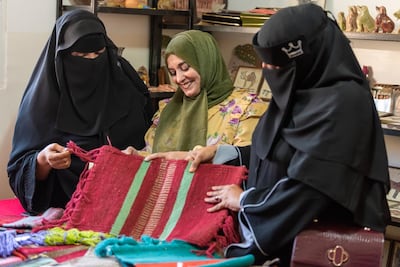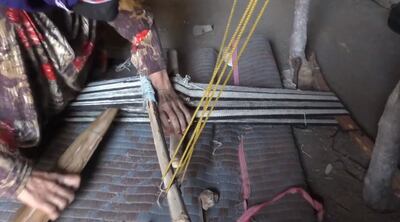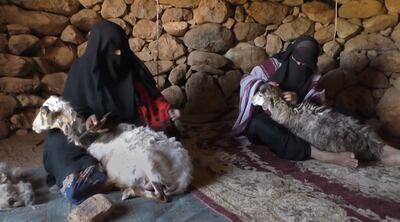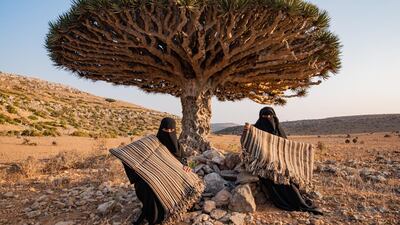Shaikhah Soliman and Ahdab Al Ameri each cradle a goat in their arms and gently cut off tufts of fur.
Later, they will thread it into spools of wool, before dyeing and weaving the coloured threads into a patterned carpet.
It's a centuries-old technique that the women, from Socotra, have been carrying out since childhood, and the duo are hoping it will remain long after their lifetimes.
As tourism to the Yemeni island increases, the two women are keen to showcase Socotra's traditional crafts. They opened the island's first handicrafts shop 10 years ago but are now seeking to reach a wider audience, with the aim of preserving traditional techniques.
Last month, Shaikhah, 39, and Ahdab, 36, were invited, along with other members of the Socotra Heritage Project team, to Amman to participate in a training programme organised by Jordan's Royal Society for the Conservation of Nature and the Royal Botanic Garden Edinburgh.
The intensive 18-day workshop was part of an initiative that seeks to promote sustainable development in Socotra while conserving the island's nature.
The workshop was part of a sustainable management programme run by the RSCN and RBGE on the Yemeni island. The main purpose of this collaboration was for Jordan's reserves to provide the Yemeni group with an on-the-ground insight into how to manage protected areas and to help develop their field experience.
The Yemeni women became involved in the preservation of culture 10 years ago when they worked together on a project that helped them set up a handicrafts shop for tourists.
With the aim of preserving the island's unique cultural heritage, they continued their interest by setting up workshops in the governorates of Hadiboh and Qalansiyah, which they now head.
“We have seen many workshops for handicrafts that have been established in the reserves as part of the socio-economic development programme for local communities,” said Shaikhah.
“Most of the workers were women from the local community.”
Over the course of the workshops, similarities in the crafting traditions of Jordan and Socotra emerged. But what impressed the Socotri women the most was the ability of the Jordanian women to produce high-quality crafts and market them locally and internationally.
Traditional carpet making in Jordan, like Socotra, uses a ground loom and natural products for dyeing the wool, although in many cases the natural colours of white and brown were used. Yemeni geographer Muhammad Al Hamdani, Socotri rugs and carpets were renowned for their quality, and formed one of Socotra’s primary exports, as far back as the 10th century.
“Carpets made on Socotra were recorded as being sold throughout the Indian Ocean from as far as the 13th century, owing to the better quality of the sheep that reflects in the quality of wool,” said archaeologist Julian Jansen van Rensburg, from the Socotra Heritage Project.
“Socotri wool has long been versatile, from making thick and hard carpets to place over the roof of their houses to stop wind and rain during the winter, to nice soft ones to wrap babies in.”
Making and selling Socotri crafts abroad is a goal that occupies the women's minds, and meeting with the Jordanians gave them valuable insight on how to achieve that, while preserving heritage and identity.
“We saw how their work has provided income-generating job opportunities in areas where opportunities are few for women in particular,” said Ahdab.
They were mostly impressed by how the Jordanian women modified some crafts to suit the requirements of the modern generation by making bags, carpets and pottery of different sizes in less traditional colours.
Their visit to Jordan's RSCN workshop reaped many valuable lessons for the women. They are now more determined than ever to overcome the many challenges ahead as residents of one of the most rudimentary islands in the region. “Jordan has made great strides in integrating the natural heritage with the cultural heritage,” said Shaikhah.
“The pottery which they manufacture using modern methods, now bear images of archaeological inscriptions, animals and plants native to their country, a practice we would like to implement in Socotra.”
Challenges remain
The small island of Socotra, about 340 kilometres south-west of Yemen, has long been known for its centuries-old, umbrella-shaped dragon blood trees, but changing temperatures and rising sea waters are putting its ecology, heritage and cultural traditions under threat.
Home to more than 60,000 people, it has remained relatively untouched by Yemen’s civil war, with Unesco describing the main island as one of the world’s “most biodiversity-rich and distinct”.
The war in Yemen, between the Houthis and pro-government forces backed by a Saudi-led coalition, since 2015 has only made the situation on the island more dire.
Traditionally, weaving on Socotra has been undertaken exclusively by women, who use a horizontal ground loom. These looms have been in use from approximately 4400BC, according to historical accounts, and are suited to the early nomadic lifestyle of the Socotri Bedouin.
“Traditional crafts of Socotra have a value that could contribute to development and livelihoods on the islands,” said Dr Alan Forrest, who works at the Centre for Middle Eastern Plants, part of Edinburgh's Royal Botanic Garden.
Yet, the biggest challenge that faces the Socotri women is the means to market, manufacture in larger numbers and export their goods.
Besides the bad internet connection, which makes online marketing, branding and selling near impossible, Shaikhah and Ahdab are trying to recruit the older women in the community to come into the institute a couple of times a month to pass on to younger generations the traditional crafting methods.
“Shaikhah and Ahdab are trying to grow the market beyond tourists in Socotra. We at the Socotra Heritage project are only there to assist and provide whatever help and advice they may need,” Dr Forrest said.
“They want to generate money and income that is supported and generated locally.” As such, the duo are not willing to give up on traditional design and techniques, and have refused to rely on modern sewing machines.
While the Socotra Heritage Project has been supported by the British Council since 2017, Shaikhah and Ahdab have been doing all of the heavy lifting.
“We don't do the work — it's about them. It's about their passion and dedication to preserve their heritage, we support them and their ideas and we try to fund them,” Dr Forrest said.
“It’s all there — they are waiting, they just need the means.”
Poland Statement
All people fleeing from Ukraine before the armed conflict are allowed to enter Poland. Our country shelters every person whose life is in danger - regardless of their nationality.
The dominant group of refugees in Poland are citizens of Ukraine, but among the people checked by the Border Guard are also citizens of the USA, Nigeria, India, Georgia and other countries.
All persons admitted to Poland are verified by the Border Guard. In relation to those who are in doubt, e.g. do not have documents, Border Guard officers apply appropriate checking procedures.
No person who has received refuge in Poland will be sent back to a country torn by war.
The specs: Lamborghini Aventador SVJ
Price, base: Dh1,731,672
Engine: 6.5-litre V12
Gearbox: Seven-speed automatic
Power: 770hp @ 8,500rpm
Torque: 720Nm @ 6,750rpm
Fuel economy: 19.6L / 100km
The specs
Engine: Two permanent-magnet synchronous AC motors
Transmission: two-speed
Power: 671hp
Torque: 849Nm
Range: 456km
Price: from Dh437,900
On sale: now
What is a robo-adviser?
Robo-advisers use an online sign-up process to gauge an investor’s risk tolerance by feeding information such as their age, income, saving goals and investment history into an algorithm, which then assigns them an investment portfolio, ranging from more conservative to higher risk ones.
These portfolios are made up of exchange traded funds (ETFs) with exposure to indices such as US and global equities, fixed-income products like bonds, though exposure to real estate, commodity ETFs or gold is also possible.
Investing in ETFs allows robo-advisers to offer fees far lower than traditional investments, such as actively managed mutual funds bought through a bank or broker. Investors can buy ETFs directly via a brokerage, but with robo-advisers they benefit from investment portfolios matched to their risk tolerance as well as being user friendly.
Many robo-advisers charge what are called wrap fees, meaning there are no additional fees such as subscription or withdrawal fees, success fees or fees for rebalancing.
The%20Sandman
%3Cp%3ECreators%3A%20Neil%20Gaiman%2C%20David%20Goyer%2C%20Allan%20Heinberg%3C%2Fp%3E%0A%3Cp%3EStars%3A%20Tom%20Sturridge%2C%20Boyd%20Holbrook%2C%20Jenna%20Coleman%20and%20Gwendoline%20Christie%3C%2Fp%3E%0A%3Cp%3ERating%3A%204%2F5%3C%2Fp%3E%0A
Countries offering golden visas
UK
Innovator Founder Visa is aimed at those who can demonstrate relevant experience in business and sufficient investment funds to set up and scale up a new business in the UK. It offers permanent residence after three years.
Germany
Investing or establishing a business in Germany offers you a residence permit, which eventually leads to citizenship. The investment must meet an economic need and you have to have lived in Germany for five years to become a citizen.
Italy
The scheme is designed for foreign investors committed to making a significant contribution to the economy. Requires a minimum investment of €250,000 which can rise to €2 million.
Switzerland
Residence Programme offers residence to applicants and their families through economic contributions. The applicant must agree to pay an annual lump sum in tax.
Canada
Start-Up Visa Programme allows foreign entrepreneurs the opportunity to create a business in Canada and apply for permanent residence.
Arabian Gulf League fixtures:
Friday:
- Emirates v Hatta, 5.15pm
- Al Wahda v Al Dhafra, 5.25pm
- Al Ain v Shabab Al Ahli Dubai, 8.15pm
Saturday:
- Dibba v Ajman, 5.15pm
- Sharjah v Al Wasl, 5.20pm
- Al Jazira v Al Nasr, 8.15pm
Five hymns the crowds can join in
Papal Mass will begin at 10.30am at the Zayed Sports City Stadium on Tuesday
Some 17 hymns will be sung by a 120-strong UAE choir
Five hymns will be rehearsed with crowds on Tuesday morning before the Pope arrives at stadium
‘Christ be our Light’ as the entrance song
‘All that I am’ for the offertory or during the symbolic offering of gifts at the altar
‘Make me a Channel of your Peace’ and ‘Soul of my Saviour’ for the communion
‘Tell out my Soul’ as the final hymn after the blessings from the Pope
The choir will also sing the hymn ‘Legions of Heaven’ in Arabic as ‘Assakiroo Sama’
There are 15 Arabic speakers from Syria, Lebanon and Jordan in the choir that comprises residents from the Philippines, India, France, Italy, America, Netherlands, Armenia and Indonesia
The choir will be accompanied by a brass ensemble and an organ
They will practice for the first time at the stadium on the eve of the public mass on Monday evening
F1 The Movie
Starring: Brad Pitt, Damson Idris, Kerry Condon, Javier Bardem
Director: Joseph Kosinski
Rating: 4/5
BULKWHIZ PROFILE
Date started: February 2017
Founders: Amira Rashad (CEO), Yusuf Saber (CTO), Mahmoud Sayedahmed (adviser), Reda Bouraoui (adviser)
Based: Dubai, UAE
Sector: E-commerce
Size: 50 employees
Funding: approximately $6m
Investors: Beco Capital, Enabling Future and Wain in the UAE; China's MSA Capital; 500 Startups; Faith Capital and Savour Ventures in Kuwait
More from Rashmee Roshan Lall
Abu Dhabi Sustainability Week
If you go
Where to stay: Courtyard by Marriott Titusville Kennedy Space Centre has unparalleled views of the Indian River. Alligators can be spotted from hotel room balconies, as can several rocket launch sites. The hotel also boasts cool space-themed decor.
When to go: Florida is best experienced during the winter months, from November to May, before the humidity kicks in.
How to get there: Emirates currently flies from Dubai to Orlando five times a week.
COMPANY%20PROFILE
%3Cp%3E%3Cstrong%3ECompany%20name%3A%3C%2Fstrong%3E%20Alaan%3Cbr%3E%3Cstrong%3EStarted%3A%3C%2Fstrong%3E%202021%3Cbr%3E%3Cstrong%3EBased%3A%3C%2Fstrong%3E%20Dubai%3Cbr%3E%3Cstrong%3EFounders%3A%3C%2Fstrong%3E%20Parthi%20Duraisamy%20and%20Karun%20Kurien%3Cbr%3E%3Cstrong%3ESector%3A%3C%2Fstrong%3E%20FinTech%3Cbr%3E%3Cstrong%3EInvestment%20stage%3A%3C%2Fstrong%3E%20%247%20million%20raised%20in%20total%20%E2%80%94%20%242.5%20million%20in%20a%20seed%20round%20and%20%244.5%20million%20in%20a%20pre-series%20A%20round%3Cbr%3E%3Cbr%3E%3C%2Fp%3E%0A
How to play the stock market recovery in 2021?
If you are looking to build your long-term wealth in 2021 and beyond, the stock market is still the best place to do it as equities powered on despite the pandemic.
Investing in individual stocks is not for everyone and most private investors should stick to mutual funds and ETFs, but there are some thrilling opportunities for those who understand the risks.
Peter Garnry, head of equity strategy at Saxo Bank, says the 20 best-performing US and European stocks have delivered an average return year-to-date of 148 per cent, measured in local currency terms.
Online marketplace Etsy was the best performer with a return of 330.6 per cent, followed by communications software company Sinch (315.4 per cent), online supermarket HelloFresh (232.8 per cent) and fuel cells specialist NEL (191.7 per cent).
Mr Garnry says digital companies benefited from the lockdown, while green energy firms flew as efforts to combat climate change were ramped up, helped in part by the European Union’s green deal.
Electric car company Tesla would be on the list if it had been part of the S&P 500 Index, but it only joined on December 21. “Tesla has become one of the most valuable companies in the world this year as demand for electric vehicles has grown dramatically,” Mr Garnry says.
By contrast, the 20 worst-performing European stocks fell 54 per cent on average, with European banks hit by the economic fallout from the pandemic, while cruise liners and airline stocks suffered due to travel restrictions.
As demand for energy fell, the oil and gas industry had a tough year, too.
Mr Garnry says the biggest story this year was the “absolute crunch” in so-called value stocks, companies that trade at low valuations compared to their earnings and growth potential.
He says they are “heavily tilted towards financials, miners, energy, utilities and industrials, which have all been hit hard by the Covid-19 pandemic”. “The last year saw these cheap stocks become cheaper and expensive stocks have become more expensive.”
This has triggered excited talk about the “great value rotation” but Mr Garnry remains sceptical. “We need to see a breakout of interest rates combined with higher inflation before we join the crowd.”
Always remember that past performance is not a guarantee of future returns. Last year’s winners often turn out to be this year’s losers, and vice-versa.
'The Last Days of Ptolemy Grey'
Rating: 3/5
Directors: Ramin Bahrani, Debbie Allen, Hanelle Culpepper, Guillermo Navarro
Writers: Walter Mosley
Stars: Samuel L Jackson, Dominique Fishback, Walton Goggins
Islamophobia definition
A widely accepted definition was made by the All Party Parliamentary Group on British Muslims in 2019: “Islamophobia is rooted in racism and is a type of racism that targets expressions of Muslimness or perceived Muslimness.” It further defines it as “inciting hatred or violence against Muslims”.
The biog
DOB: 25/12/92
Marital status: Single
Education: Post-graduate diploma in UAE Diplomacy and External Affairs at the Emirates Diplomatic Academy in Abu Dhabi
Hobbies: I love fencing, I used to fence at the MK Fencing Academy but I want to start again. I also love reading and writing
Lifelong goal: My dream is to be a state minister
UAE v United States, T20 International Series
Both matches at ICC Academy, Dubai. Admission is free.
1st match: Friday, 2pm
2nd match: Saturday, 2pm
UAE squad: Mohammed Naveed (captain), Rohan Mustafa, Ashfaq Ahmed, Shaiman Anwar, Rameez Shahzad, Amjad Gul, CP Rizwan, Mohammed Boota, Abdul Shakoor, Ahmed Raza, Imran Haider, Sultan Ahmed, Zahoor Khan, Amir Hayat
USA squad: Saurabh Netravalkar (captain), Jaskaran Malhotra, Elmore Hutchinson, Aaron Jones, Nosthush Kenjige, Ali Khan, Jannisar Khan, Xavier Marshall, Monank Patel, Timil Patel, Roy Silva, Jessy Singh, Steven Taylor, Hayden Walsh
Business Insights
- As per the document, there are six filing options, including choosing to report on a realisation basis and transitional rules for pre-tax period gains or losses.
- SMEs with revenue below Dh3 million per annum can opt for transitional relief until 2026, treating them as having no taxable income.
- Larger entities have specific provisions for asset and liability movements, business restructuring, and handling foreign permanent establishments.
UAE currency: the story behind the money in your pockets
Off-roading in the UAE: How to checklist
Padmaavat
Director: Sanjay Leela Bhansali
Starring: Ranveer Singh, Deepika Padukone, Shahid Kapoor, Jim Sarbh
3.5/5
What can victims do?
Always use only regulated platforms
Stop all transactions and communication on suspicion
Save all evidence (screenshots, chat logs, transaction IDs)
Report to local authorities
Warn others to prevent further harm
Courtesy: Crystal Intelligence
Signs%20of%20%20%20%20%20%20%20heat%20stroke
%3Cul%3E%0A%3Cli%3EThe%20loss%20of%20sodium%20chloride%20in%20our%20sweat%20can%20lead%20to%20confusion%20and%20an%20altered%20mental%20status%20and%20slurred%20speech%3C%2Fli%3E%0A%3Cli%3EBody%20temperature%20above%2039%C2%B0C%3C%2Fli%3E%0A%3Cli%3EHot%2C%20dry%20and%20red%20or%20damp%20skin%20can%20indicate%20heatstroke%3C%2Fli%3E%0A%3Cli%3EA%20faster%20pulse%20than%20usual%3C%2Fli%3E%0A%3Cli%3EDizziness%2C%20nausea%20and%20headaches%20are%20also%20signs%20of%20overheating%3C%2Fli%3E%0A%3Cli%3EIn%20extreme%20cases%2C%20victims%20can%20lose%20consciousness%20and%20require%20immediate%20medical%20attention%3C%2Fli%3E%0A%3C%2Ful%3E%0A





